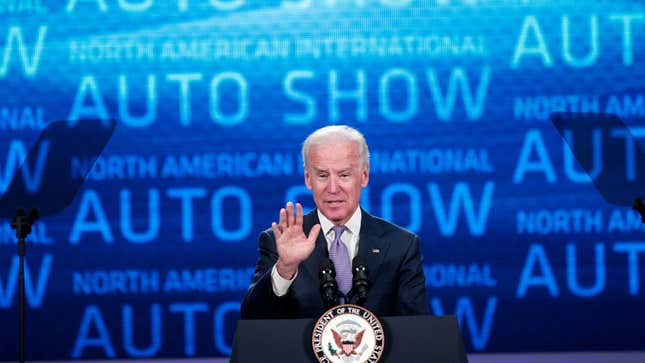
The longest race in the world has been unofficially decided: former Vice President Joe Biden has been tentatively named the President Elect of the United States. Whether that sticks until inauguration day remains to be seen since there are still pending lawsuits regarding the whole “vote counting” situation, but at the very least, we can have a conversation about the things we do know: cars and Joe Biden.
Biden Is A Car Guy
We’ve covered this before here on Jalopnik, but Joe Biden digs cars. We’ve seen him doing burnouts, making bets, and declaring his eternal loyalty to the Corvette Dad brand.
In these times of uncertainty, it is at least comforting to know one thing: the guy in office likes cars enough to keep the auto industry thriving.
An Electric Future?
Volkswagen boss Herbert Diess seems to think so. We mentioned him earlier this week in The Morning Shift, when Diess stated that “a Democrat program would be more aligned with our worldwide strategy to fight climate change to go electric.”
The Democratic ticket has been more stringent when it comes to the auto industry in the past few years, largely due to the effects of climate change. While Biden has noted that he’d like to keep auto industry jobs localized in the United States, he’s expected to propose a lot of policies that would counteract those of the Trump Era by introducing $400 billion in public investment to transition to clean energy.
From Reuters:
Biden is expected to quickly reinstate the legal basis for California’s zero-emission vehicle rules and begin the process of reversing the Trump administration’s decision to ease fuel efficiency and carbon emission requirements through 2025. Automakers could also face sharply higher penalties for failing to meet fuel-efficiency requirements. The Trump administration rolled back those penalties, which the industry said saved at least $1 billion in annual compliance costs, but a federal appeals court in August reversed the administration action.
That said, Biden is also looking to bolster the EV economy in ways that appeal to automakers: via tax incentives for buyers as well as the development of a more comprehensive national charging infrastructure.
With a divided government, it’s not likely that we’ll see a ton of sweeping changes on that front—it’ll likely head back into the realm of state governments. But we might see a Biden administration paving the way for those changes to take place.
Emissions
On his website’s policy page, Biden states that he aims to further improve fuel economy standards beyond what was implemented under President Obama (where automakers had to reduce carbon dioxide emissions for passenger and light-duty vehicles by 3.5% annually from 2017 to 2021 and by 5% per year from 2022 to 2025).
Beyond that, Biden has stated that he aims to create jobs dedicated to “build[ing] a modern, sustainable infrastructure now and deliver[ing] an equitable clean energy future.”
What that looks like remains to be seen.
American Jobs
If there was one thing Biden and Trump agreed on, it’s the return of American-based jobs, specifically within the auto industry. Biden has stated that he’s seeking to revitalize and empower unions while also adding 1 million jobs across the auto industry.
Strong unions sound like a good thing for many auto workers, but there’s also a widespread concern that a swap to electric cars will see a widespread loss of jobs in the automotive sector.
Oh, And That Trade War With China
Biden hasn’t outlined any hard-and-fast policy about how he’d aim to bring the trade war with China to a close after Trump heavily restricted the flow of foreign-made parts and cars. According to his team, he’ll “re-evaluate” those tariffs, but what, exactly, that means isn’t completely clear.
That said, Reuters believes we’ll see Biden supporting the World Trade Organization to create a more democratic flow of goods, as well as seeking membership in the Trans-Pacific Partnership, which currently facilitates effective trade between Japan, Canada, Mexico, Malaysia, Vietnam, Australia, New Zealand Singapore, Chile, Peru and Brunei.
A Divided Industry
As with pretty much everything in America right now, the auto industry is seriously divided. Many automakers have committed to an electric future, but there are still serious costs associated with making that happen, which made Biden an undesirable candidate for some marques. Trump’s trade wars against internationally imported cars and parts wasn’t popular on a global front, but some US-based workers liked the promise of better wages and more work.
That said, Biden has a history of strong support for the auto industry during his time as Vice President in the Obama administration. How that will manifest in the next four years remains to be seen, but it is reasonable to expect he’ll provide positive aid to the industry.